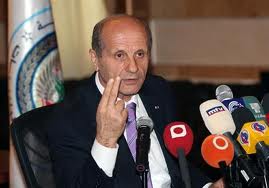 Lebanon risks being sucked into a worsening spiral of violence that has already begun to spill over from neighboring Syria unless its deeply divided leaders set aside their disputes, Interior Minister Marwan Charbel said.
Lebanon risks being sucked into a worsening spiral of violence that has already begun to spill over from neighboring Syria unless its deeply divided leaders set aside their disputes, Interior Minister Marwan Charbel said.
The situation was so tense that the tiny Arab Mediterranean country could not afford the luxury of internal disputes, including a row over disarming the Shi’ite movement Hezbollah, and needed to agree to set them aside for now, he added.
“If, God forbid, something happened in Lebanon I do not think there would be anyone to help. There would be an absurd war among the Lebanese in which everyone would lose,” Charbel told Reuters in an interview late on Friday.
“Conditions now do not allow for disputes.”
Lebanon is still recovering from its bloody 1975-1990 civil war, but unrest in its larger and more powerful neighbor Syria has fuelled long-running tensions, sparking violent clashes on the streets of its northern port city of Tripoli and of its capital Beirut.
The opposition March 14 grouping has called on Prime Minister Najib Mikati’s government, a coalition which includes Charbel’s mainly Christian Free Patriotic Movement and the Shi’ite Hezbollah group, to be replaced by a “salvation government.”
It is also pressing for the disarmament of Hezbollah, Lebanon’s powerful Shi’ite militant and political group that fought a war against Israel in 2006. Hezbollah supports Syrian President Bashar al-Assad in his crackdown on his opponents.
Hezbollah was the only armed group to retain its weapons after the end of the civil war – its domestic rivals have always been uneasy about its arsenal, but it has proved too powerful within Lebanon to be forced to surrender it.
It initially said it needed to keep its weapons to confront Israeli forces which maintained their occupation of southern Lebanon for 10 years after the civil war ended. It now says it needs to keep them to deter any future attack by Israel.
“The argument over the government is a minor one and the argument over Hezbollah’s arms is minor – any other disagreements are minor compared to what Lebanon would face because of what is happening in Syria,” said Charbel.
GUNMEN
Ruling a country of just four million people, Lebanon’s government has often been paralyzed by squabbling among its religiously and politically divided members, many of whom are in parties formed during the 15-year civil war.
Political leaders have held a series of largely fruitless “national dialogue” meetings to try to overcome their differences, which have hampered efforts to tackle massive public debt and crippling electricity shortages.
“I call on those sitting at the table of dialogue not to demand any preconditions. Our first priority is saving Lebanon from the calamity we have fallen into,” Charbel said.
Charbel said the debate over Hezbollah’s weapons had hindered efforts by security forces to clamp down on other armed groups and their weapons, fearing a political conflagration.
Hezbollah’s Sunni Muslim political opponents have supported the Syrian uprising, and it is gunmen from their ranks that have clashed with Assad supporters, particularly in Tripoli.
“It would be very easy to carry out raids and clear out the gunmen (in Tripoli),” said Charbel. “But then other Lebanese groups will say there are other places with weapons. That would be an embarrassing subject because it would seem security forces were not applying the law everywhere.”
However, Charbel said security forces were tightening up security at Lebanon’s border with Syria, across which rebels have been smuggling weapons to the opposition.
“Weapons smuggling has dropped substantially because the Lebanese army has tightened its grip on legal crossings and that was where most of the smuggling happened,” he said.
“But we should not forget that the border is 180 km (111 miles) long and the Lebanese army and security forces are not capable of covering all that.”
Militants using Lebanon as a crossing point into Syria had increased in numbers, he added, but security forces were improving their technical capabilities at airports, seaports and borders in order to apprehend them.
Reuters

Leave a Reply
You must be logged in to post a comment.